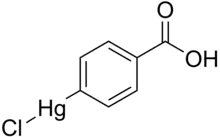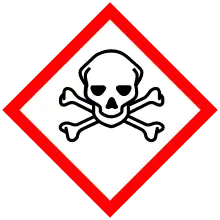 | |
 | |
| Names | |
|---|---|
| IUPAC name
(4-Carboxyphenyl)chloromercury | |
| Other names
p-Chloromercurybenzoic acid; p-Chloromercuribenzoate; 4-Chloromercuribenzoate | |
| Identifiers | |
3D model (JSmol) |
|
| Abbreviations | PCMB |
| 3662892 | |
| ChEBI | |
| ChEMBL | |
| ChemSpider | |
| ECHA InfoCard | 100.000.402 |
| EC Number |
|
| 261316 | |
| KEGG | |
PubChem CID |
|
| UNII | |
CompTox Dashboard (EPA) |
|
| |
| |
| Properties | |
| C7H5ClHgO2 | |
| Molar mass | 357.16 g·mol−1 |
| Melting point | 287 °C (549 °F; 560 K) (dec.) |
| Hazards | |
| GHS labelling: | |
   | |
| Danger | |
| H300, H310, H330, H373, H410 | |
| P260, P262, P264, P270, P271, P273, P280, P284, P301+P310, P302+P350, P304+P340, P310, P314, P320, P321, P322, P330, P361, P363, P391, P403+P233, P405, P501 | |
Except where otherwise noted, data are given for materials in their standard state (at 25 °C [77 °F], 100 kPa).
Infobox references | |
4-Chloromercuribenzoic acid (p-chloromercuribenzoic acid, PCMB) is an organomercury compound that is used as a protease inhibitor, especially in molecular biology applications.
PCMB reacts with thiol groups in proteins and is therefore an inhibitor of enzymes that are dependent on thiol reactivity, including cysteine proteases such as papain and acetylcholinesterase. Because of this reactivity with thiols, PCMB is also used in titrimetric quantification of thiol groups in proteins.
See also
References
This article is issued from Wikipedia. The text is licensed under Creative Commons - Attribution - Sharealike. Additional terms may apply for the media files.